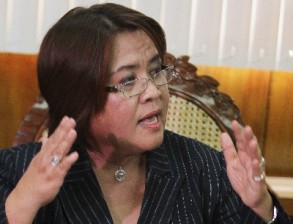
Justice Secretary Leila de Lima INQUIRER FILE PHOTO
MANILA, Philippines—Justice Secretary Leila de Lima on Thursday blamed the dilatory tactics of defense lawyers in the Maguindanao massacre case for the slow progress of the trial, which has been going on for almost three years now.
On the eve of the third anniversary of the infamous massacre, even the Supreme Court had something to say about the trial being handled by Judge Jocelyn Solis-Reyes of branch 221 of the Quezon City Regional Trial Court since January 2010.
“Considering the unique and unprecedented nature of this case, and the volume of the work still to be done, the speedy disposition of this case depends on the cooperation of all the parties involved,” acting public information chief Gleo Guerra said in a statement she read at the Supreme Court.
“Our judge has already exerted a tremendous amount of effort and work and knows it is her duty to continue doing so,” Guerra said, in reference to Judge Reyes.
Guerra issued the statement basically to update the media on the status of the so-called trial of the century, which she said has already had 264 hearing dates and heard the testimonies of 101 witnesses so far.
Guerra said that 35 lawyers, mostly public prosecutors, were actively prosecuting the cases, against the 54 lawyers defending at least 81 persons, including former former mayor Andal Ampatuan Jr.of the town of Datu Usay, currently on trial on multiple charges for killing 58 people, mostly journalists in Maguindanao on Nov. 23, 2009.
Speaking to reporters after she met officials of the National Union of Journalists of the Philippines (NUJP) about the massacre trial, De Lima said there was no need to add more members to the prosecution team because they have been doing their job well but that they have been prevented from presenting key witnesses for the past two years because of “dilatory tactics” of the defense.
“The problem is the penchant of the defense side to question the presentation of certain witnesses and file petitions in the appellate courts like the Court of Appeals and the Supreme Court,” De Lima said.
She said these actions by the defense have delayed the prosecution’s presentation of its key witnesses, such as Kevin Dalandag. The prosecution is then forced to present “less vital witnesses.”
Asked if the defense was deliberately delaying the trial, De Lima said, “That’s what they’re doing,” as she pointed out their “penchant for dilatory tactics.”
De Lima also pointed out that Judge Reyes was the type to wait for the rulings of the appellate court “before she allows the presentation of witnesses.”
De Lima told NUJP officials led by executive director Rowena Paraan the prosecution that President Aquino “is always concerned about the slow progress of cases, including the Maguindanao massacre trial, but he is regularly updated and advised on developments of the case.”
She said her office was coordinating with the high court, particularly Chief Justice Ma. Lourdes Sereno, in monitoring the trial proceedings.
De Lima told the NUJP officials that she had submitted a proposed administrative order to President Aquino on the creation of a high-level interagency group that will address enforced disappearances, extrajudicial killings and other grave human rights violations.
Asked whether the Department of Justice would file a motion for asking the Supreme Court to reconsider its ruling barring the live broadcast of the massacre trial, she said she still has to ask the advice of the prosecutors. But she noted that the prosecutors were split on the latest high court ruling, with some agreeing and the others objecting.
In a letter to the President, the NUJP said it was “deeply disappointed at your lack of meaningful action” on his campaign promise to address the problem of impunity in the country. It said the trial was “moving with extraordinary slowness.”
“It is estimated that, at its current pace and with the number of motions filed by the defense, the Ampatuan trial will take a minimum of 24 years before a result is achieved—a mockery that insults the memory of the dead and seriously questions the resolve of the authorities to see that justice is done,” said the NUJP.
It said that under President Aquino’s watch, 14 journalists have been killed, five of them just this year.
“We wish to urge you to use this third anniversary as an opportunity for a new beginning, a broad government effort to ensure the Philippines turns a new page and ends the impunity that has plagued your country for decades,” the group said.
According to Guerra, 98 of the 196 accused of the massacre have been arrested and 81 of them have been arraigned. A total of 57 accused have also applied for bail.
At the hearings, 307 motions and other matters have been filed or raised and 204 of these have been resolved.
“As a result of these motions, 447 comments, oppositions, rejoinders and manifestations have been additionally filed. To date, the records of the case have reached 148 volumes,” she said.